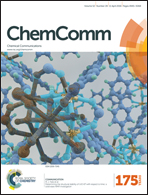Molybdenum carbide as an efficient catalyst for low-temperature hydrogenation of dimethyl oxalate†
Abstract
Silica-supported molybdenum carbide (Mo2C/SiO2) is found to be a highly active, selective and stable catalyst for the hydrogenation of dimethyl oxalate to ethanol at low temperatures (473 K). Moreover, the formation of ethanol over the Mo2C catalyst performs via the novel intermediate methyl acetate instead of ethylene glycol forming over the Cu catalyst.


 Please wait while we load your content...
Please wait while we load your content...